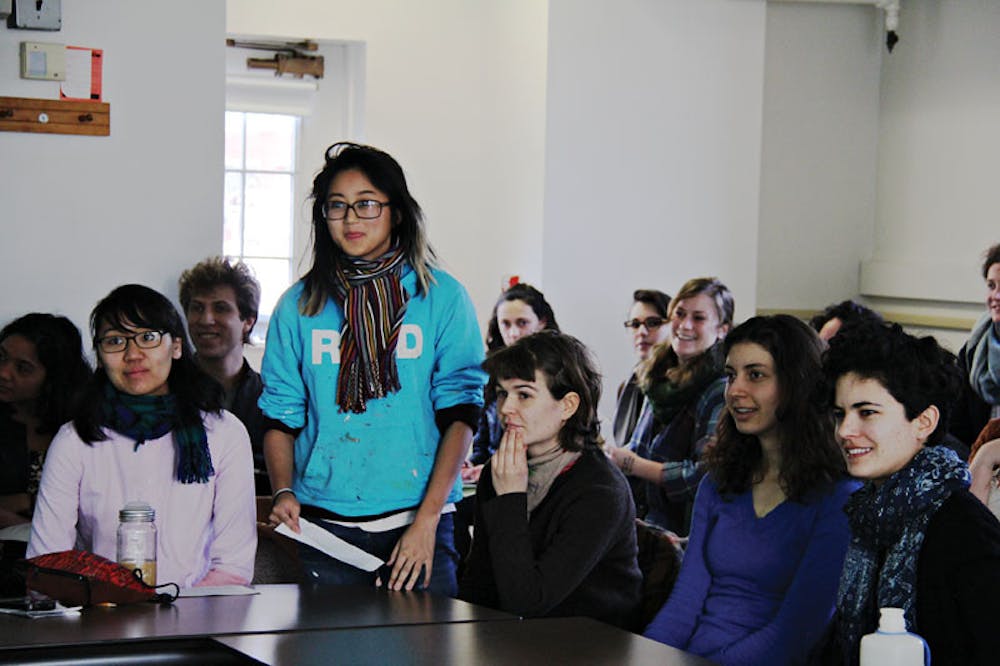Students voiced sharp disagreement against proposed changes to the environmental studies concentration at a public forum Friday. Approximately 40 students and three of the 10 faculty members who served on the Committee to Review the Environmental Studies Concentration attended the forum, which was held at the Urban Environmental Laboratory to solicit student feedback on the changes.
The recommendations would reshape the concentration by establishing a new core of four required courses and creating four possible tracks, according to the report. If approved by the College Curriculum Council, the changes would affect the class of 2017 and beyond.
The report’s proposed tracks are: land and coast, conservation science and policy, sustainable development and climate and energy. Students at the forum said their primary objection to the recommendations is the failure to include a food and health track, which would encompass topics like sustainable food and agriculture.
The recommendations will go before the College Curriculum Council’s Executive Committee Tuesday. If approved by the Executive Committee, the changes will then be voted on by the full CCC at a later time.
Food-related courses have been consistently enrolled to capacity, students said, adding that almost half of the Bachelor of Arts theses for environmental studies concentrators over the past three years have pertained to food and health topics. The students opposed to the changes voiced their concerns via a drafted statement they wrote before the forum.
Students cited Yale’s environmental studies undergraduate program, which has concentrations in food and agriculture and human health, as a model for the track they would like to see the Center for Environmental Studies adopt.
Dov Sax, assistant professor of biology and a member of the review committee, said a food and health track was originally included in the report but was removed due to limited financial and human resources. The committee decided a food and health track would be unfeasible given how few faculty members specialize in this area, he said.
Students responded to Sax by asking why the report did not endorse recruiting the faculty necessary to support a food and health track. Amanda Lynch, professor of geological sciences and a review committee member, said hiring recommendations initially included in the report had to be taken out. Because the environmental studies program does not belong in a single department, the Center for Environmental Studies is not allowed to make hiring recommendations, she said.
Students also voiced opposition to the inclusion of ECON 0110: “Principles of Economics” as a newly required core course. The inclusion of ECON 0110 prioritizes economic analysis over other disciplines, students opposing the change said.
The proposed removal of ENVS 0110: “Humans, Nature and the Environment: Addressing Environmental Change in the 21st Century” from the core of the concentration also drew criticism, as students described the course as vital to attracting concentrators.
Janet Blume, interim director of the Center for Environmental Studies and associate dean of the faculty, said Dean of the College Katherine Bergeron, who co-chaired the review committee and leads the University’s efforts to revamp concentrations, supported requiring environmental studies concentrators to take ECON 0110.
Sax said the committee included ECON 0110 as a newly required course because members agreed it was necessary for understanding all four proposed tracks of the concentration.
Blume, who also served as co-chair of the review committee, said she hopes a new environmental economics course will be developed in the future to replace ECON 0110 as a core requirement. Though not required, ENVS 0110 would still be highly encouraged for concentrators, Blume said.
Students said the fast-paced timing of the proposed changes caught them off-guard, adding that there was no opportunity for the report to be altered in response to student feedback before the Executive Committee vote Tuesday.
If the report is presented to the committee without changes, “Everyone that spoke today is going to have been left out of the process,” said David Granberg ’13, one of two students who served on the review committee.
Katie Parker ’14, an environmental studies concentrator, said she felt the review committee did not properly solicit input from students. The committee created a written form to encourage student responses, but Parker said she did not think those responses were incorporated in the report.
Blume told The Herald after the forum she thought the implication that student input was ignored is inaccurate. She noted that she took the initiative of organizing the forum specifically to hear student responses and set up the online feedback form, adding that only three students filled it out.
“We really want to serve students,” Blume wrote in an email to The Herald. “That’s what it’s all about. That’s why we are here.”

ADVERTISEMENT




